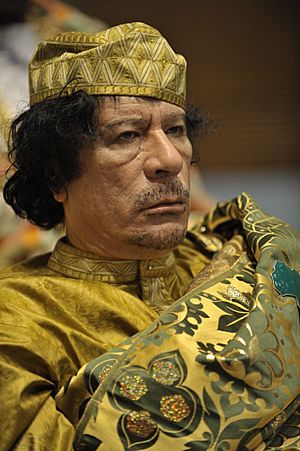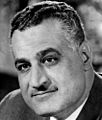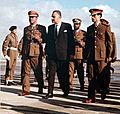Muammar Gaddafi facts for kids
Quick facts for kids
Muammar Gaddafi
مُعَمَّر القَذَّافِي |
|
|---|---|

Muammar al-Gaddafi at an African Union Summit in 2009
|
|
| Leader and Guide of the Revolution | |
| In office 1 September 1969 – 23 August 2011 |
|
| President |
show all
Abdul Ati al-Obeidi
Muhammad az-Zaruq Rajab Mifta al-Usta Umar Abdul Razzaq as-Sawsa Muhammad al-Zanati Miftah Muhammed K'eba Imbarek Shamekh Mohamed Abu Al-Quasim al-Zwai |
| Prime Minister |
show all
Jadallah Azzuz at-Talhi
Muhammad az-Zaruq Rajab Jadallah Azzuz at-Talhi Umar Mustafa al-Muntasir Abuzed Omar Dorda Abdul Majid al-Qa′ud Muhammad Ahmad al-Mangoush Imbarek Shamekh Shukri Ghanem Baghdadi Mahmudi |
| Preceded by | Position established |
| Succeeded by | Position abolished |
| Secretary General of the General People's Congress of Libya | |
| In office 2 March 1977 – 2 March 1979 |
|
| Prime Minister | Abdul Ati al-Obeidi |
| Preceded by | Position established |
| Succeeded by | Abdul Ati al-Obeidi |
| Prime Minister of Libya | |
| In office 16 January 1970 – 16 July 1972 |
|
| Preceded by | Mahmud Sulayman al-Maghribi |
| Succeeded by | Abdessalam Jalloud |
| Chairman of the Revolutionary Command Council of Libya | |
| In office 1 September 1969 – 2 March 1977 |
|
| Prime Minister | Mahmud Sulayman al-Maghribi Abdessalam Jalloud Abdul Ati al-Obeidi |
| Preceded by | Idris |
| Succeeded by | Position abolished |
| Chairperson of the African Union | |
| In office 2 February 2009 – 31 January 2010 |
|
| Preceded by | Jakaya Kikwete |
| Succeeded by | Bingu wa Mutharika |
| Personal details | |
| Born | c. 1940-43 Qasr Abu Hadi, Italian Libya |
| Died | October 20, 2011(aged c. 69) Sirt, Libya |
| Spouses | Fatiha al-Nuri (divorced) Safia Farkash (m. 1970–2011, his death) |
| Children |
|
| Signature |  |
| Military service | |
| Allegiance | |
| Branch/service | Libyan Army |
| Years of service | 1961–2011 |
| Rank | Colonel |
| Commands | Commander-in-chief, Libyan Armed Forces |
| Battles/wars | Libyan–Egyptian War Chadian–Libyan conflict Uganda–Tanzania War 2011 Libyan civil war |
Muammar Muhammad Abu Minyar al-Gaddafi (Arabic: مُعَمَّر القَذَّافِي Muʿammar al-Qaḏḏāfī ) (born around 1942 – died 20 October 2011) was a Libyan politician. He was the leader of Libya for over 40 years, from 1969 until 2011.
Contents
Muammar Gaddafi's Early Life
Muammar Mohammed Abu Minyar al-Gaddafi was born in a rural area near Sirte in western Libya. He was the only son and the youngest of four children in his family. His family belonged to a small tribe called the Qadhadhfa. They were Arab and his father was a goat and camel herder.
Gaddafi's family were nomads, meaning they moved from place to place. They did not keep birth records, so his exact birthday is not known. Most sources say he was born in 1942 or 1943.
From a young age, Gaddafi knew about European countries controlling Libya. Italy had occupied his country. After World War II, Britain and France occupied Libya. The United Nations decided Libya should be independent. In 1951, Libya became the United Kingdom of Libya under King Idris.
Gaddafi first learned from a local Islamic teacher. Later, he went to elementary school in Sirte. Education was not free, but his father made sacrifices for him to attend. During the week, Gaddafi slept in a mosque. On weekends, he walked 20 miles (32 km) to see his parents. He faced bullying from city kids because he was from a poor nomadic family.
Gaddafi's Rise to Power in Libya
Gaddafi briefly studied history at the University of Libya in Benghazi. He left university to join the military in 1961. Joining the military was one of the few ways for people from lower social classes in Libya to improve their lives.
Inside the military, Gaddafi started a group that wanted to change the government. In 1969, his group successfully overthrew King Idris in a coup. A coup is when a small group suddenly takes control of a government, often by force.
After taking power, Gaddafi made Libya a republic. He led the Libyan Revolutionary Command Council. He removed Libya's Italian population and closed Western military bases. He also wanted to strengthen ties with other Arab nations. He tried to create a united Arab political group, but it did not work.
Gaddafi's Rule and Policies
Gaddafi introduced sharia (Islamic law) as the basis for Libya's legal system. He also promoted "Islamic socialism". This was a mix of Islamic beliefs and socialist ideas about sharing wealth.
He took control of the oil industry for the state. He used the money from oil to make the military stronger. He also used it to support revolutionaries in other countries. Inside Libya, he started programs to build houses, improve healthcare, and provide education.
In 1973, Gaddafi began a "Popular Revolution". He created Basic People's Congresses. These were meant to be a system of direct democracy, where people directly made decisions. However, Gaddafi still controlled most major decisions himself. He wrote down his ideas in a book called The Green Book.
In 1977, Gaddafi changed Libya into a new kind of socialist state called a Jamahiriya. This means "state of the masses." He officially took on a symbolic role in the government. But he remained the head of the military and the groups that kept order and stopped people from disagreeing with him.
Libya's International Relations
During the 1970s and 1980s, Libya had conflicts with Egypt and Chad. Libya also supported various groups in other countries. These actions made Libya more isolated from the rest of the world.
Libya had a very difficult relationship with Israel, the United States, and the United Kingdom. This led to the U.S. bombing of Libya in 1986. The United Nations also placed economic sanctions on Libya. Sanctions are penalties that limit trade and financial dealings.
After 1999, Gaddafi changed his approach. He moved away from the idea of Arab unity. Instead, he supported pan-Africanism, which is the idea of unity among African nations. He also tried to improve relations with Western countries. He was the Chairperson of the African Union from 2009 to 2010.
The 2011 Libyan Civil War
In 2011, protests started in eastern Libya. These protests were part of the Arab Spring, a series of uprisings in Arab countries. People were protesting against corruption and high unemployment.
The protests quickly turned into a civil war. NATO, a military alliance, got involved. They supported the anti-Gaddafi group called the National Transitional Council (NTC).
Gaddafi's government was overthrown. He went to Sirte, his hometown. On October 20, 2011, NTC fighters captured and killed him.
Gaddafi's Legacy and Impact
Gaddafi was a very influential figure in Libya for four decades. People had very different opinions about him. He was praised by some for standing against powerful countries. He was also praised for supporting Arab and African unity.
Many people also recognized that he brought significant development to Libya. This happened after oil was discovered in the country.
However, many Libyans did not agree with Gaddafi's changes. He was accused of violating human rights. Many people saw him as a dictator. A dictator is a ruler with total power over a country, often by force.
After Gaddafi's defeat, his system of government was replaced. The NTC formed an interim government. They allowed trade unions and freedom of the press. In 2012, elections were held for a new General National Congress (GNC). The GNC officially took over from the NTC. In 2013, the GNC renamed the Jamahiriyah as the "State of Libya."
Some people who supported Gaddafi formed a group called the Green Movement. This group became the Libyan Popular National Movement party. However, the Libyan government stopped this party from taking part in elections. They also banned symbols related to Gaddafi.
Gaddafi's Personal Life
Gaddafi cared a lot about his appearance. He had many clothes and sometimes changed outfits several times a day. He often wore military uniforms or traditional Libyan clothing. He thought of himself as a trendsetter.
After he came to power, Gaddafi lived in the Bab al-Azizia barracks. This was a large, fortified compound in Tripoli. His lifestyle was considered modest compared to other Arab leaders at the time.
Gaddafi was very concerned about his safety. He often changed where he slept. When he flew, he sometimes grounded all other planes in Libya. When he traveled to other countries, he had special requests. He often stayed in a bulletproof tent, following his Bedouin traditions. He was known for being direct with foreign powers. He often avoided Western ambassadors, thinking they might be spies.
Gaddafi married his first wife, Fatiha al-Nuri, in 1969. They had one son, Muhammad Gaddafi (born 1970), but they divorced in 1970. His second wife was Safia Farkash. She was a nurse. They met in 1969 when he was in the hospital. They stayed married until his death. They had seven biological children and adopted two more.
Images for kids
-
Egyptian President Nasser was Gaddafi's political hero.
-
Gaddafi at an Arab summit in Libya in 1969, shortly after the September Revolution that toppled King Idris I. Gaddafi sits in military uniform in the middle, surrounded by Egyptian President Gamal Abdel Nasser (left) and Syrian President Nureddin al-Atassi (right).
-
In 1971, Egypt's Anwar Sadat, Libya's Gaddafi and Syria's Hafez al-Assad signed an agreement to form a federal Union of Arab Republics. The agreement never materialized into a federal union between the three Arab states.
-
Gaddafi with Romanian communist leader Nicolae Ceaușescu in Bucharest, Romania, 1974
-
Gaddafi with Spanish Prime Minister José Luis Rodríguez Zapatero in 2010
See also
 In Spanish: Muamar el Gadafi para niños
In Spanish: Muamar el Gadafi para niños













